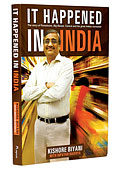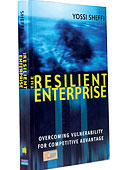 |
IT HAPPENED IN INDIA
By Kishore Biyani with Dipayan Baishya Rupa
Pp: 268
Price: Rs 99 |
Kishore Biyani is stark
mad. And he won't send Business Today and this writer a legal
notice for saying so. The pioneer of organised retail in India-who
has built such brands as Pantaloons, Big Bazaar, Food Bazaar and
Central-is in a destructive mood these days. A few months ago,
he demolished the organisation's structure, painstakingly created
over the past decade (since venturing into modern retail with
the Pantaloon chain of stores), to create a new platform for new
ideas.
Biyani is different, refreshingly. He hasn't yet read his horoscope
(and doesn't appear likely to), and since an early age has been
against religious practices and rituals. He's even tried to write
this book in a non-linear format which, though commendable, may
irritate conventional readers. But that's typical of a man who
thought of the brand name WBB for the launch of a fabric for men's
trousers way back in the 80s. Abhay Kamat, a long-time friend
of Biyani, says: "I asked him what the brand meant. His reply
was: 'It is innovative.' I thought he was crazy." WBB incidentally
stands for White, Blue and Brown. It worked.
Nobody calls him crazy today because he's made it. "When
one is young and tries to rewrite rules he is called 'mad.' But
when he is finally successful, because he dared to risk it, he
is called a 'maverick'." Biyani is still young (45), and
the Future Group and organised retail itself in India are in their
infantile years. So, why is he writing a biography when he and
the industry still have miles to go? After all, one of his idols,
Sam Walton ("the original master of rewriting rules"),
founder of Wal-Mart, authored the classic Made in America, when
he was on his deathbed. Biyani's efforts are ground-breaking,
but as Irena Vittal, who heads McKinsey's retail practice in India,
notes: "…It's too early to decide whether he is successful
or not. The game has just begun."
Biyani provides the answer in the Foreword to the book, via
the voice of his son. He sees a need to tell his story to the
'potential' India of tomorrow, a story of "ordinary people
who have made extraordinary things happen during our times."
But the book may also be a sub-conscious attempt at attracting
the accolades, which have been slow in coming. Biyani is conscious
about the chasm that exists between first-generation achievers
like him-"small-time Marwari banias" who didn't go to
B-school-and the "inheritors". "There is a much
respected lady from a large business house who used to refer to
ours as 'dirty stores'," writes Biyani.
Like many of the better business biographies, this one works
at various levels--of the individual, the organisation he's built,
the industry he operates in, the consumer he sells to and the
insights he's picked up along the way. If reading about those
who have done it can indeed help one become a successful entrepreneur,
It Happened in India has to be compulsory reading.
 |
|
RESILIENT ENTERPRISE
By Yossi Sheffi
Pearson Education
Pp: 338
Price: Rs 375
|
It's every manufacturer's worst
nightmare: parts that are supposed to reach the assembly line
just in time don't for whatever reason. Lost sales is just one
fallout of this scenario; loss in market share and customers switching
to some other product are other damaging possibilities. In the
modern environment, where supply chains are far flung not just
within the country but across the globe and manufacturers have
fewer back-up suppliers, any disruption in supplies can have grave
consequences. The Resilient Enterprise, then, is about how competitiveness
depends not so much on what the company does after disaster strikes
as what it does before. Using examples, Sheffi, a professor of
Engineering Systems at MIT and Director of the MIT Centre for
Transportation and Logistics, shows how supply chain breakdowns
can have devastating impacts, and what techniques companies can
use to plan for contingencies. Standardisation, modular design
and collaboration with suppliers, Sheffi says, are some ways in
which the modern-day manufacturer can become resilient. The good
part about the book is that although it is about a subject as
complex as supply chain, it in itself is not complicated. Sheffi
employs an easy narrative, and steers clear of complicated charts
and graphs. Anyone responsible for managing supply chain will
find that Sheffi's book, as one testimonial says, provides "food
for thought and stimulus for action".
|






